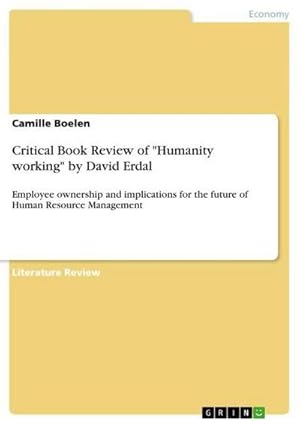9783656822288 - Critical Book Review of "Humanity working" by David Erdal: Employee ownership and implications for the future of Human Resource Management von Boelen, Camille (1 Ergebnisse)
Produktart
- Alle Produktarten
- Bücher (1)
- Magazine & Zeitschriften
- Comics
- Noten
- Kunst, Grafik & Poster
- Fotografien
- Karten
-
Manuskripte &
Papierantiquitäten
Zustand
- Alle
- Neu
- Antiquarisch/Gebraucht
Einband
- alle Einbände
- Hardcover
- Softcover
Weitere Eigenschaften
- Erstausgabe
- Signiert
- Schutzumschlag
- Angebotsfoto
Land des Verkäufers
Verkäuferbewertung
-
Critical Book Review of "Humanity working" by David Erdal : Employee ownership and implications for the future of Human Resource Management
Verlag: GRIN Verlag, 2014
ISBN 10: 365682228XISBN 13: 9783656822288
Anbieter: Smartbuy, Einbeck, Deutschland
Buch
Taschenbuch. Zustand: Neu. Druck auf Anfrage Neuware - Printed after ordering - Literature Review from the year 2013 in the subject Leadership and Human Resource Management - Miscellaneous, grade: 20/20 Distinction, University of St Andrews, course: Human Resource Management, language: English, abstract: «The more equal and involved community gave people longer, happier lives» (Erdal, 2011: 242). 'Beyond the corporation: Humanity working' is a factual and policy text of our modern economic system, in which David Erdal proposes to extend democracy into organisations, contributing to a better distribution of wealth. As a consequence, this view raises substantial economic, political and social debates. It is essential to indicate that the book was published not long after the financial crisis of 2008, which provides the author with an ideal context for supporting organic growth rather than seeking investment through capital markets. David Erdal has progressively built his credentials in the area of humanity working and Human egalitarianism. Starting from leveraging an employee buyout of his family business and being awarded the Scottish Business Achievement Award in 1989, he has then undertaken considerable procedures in creating an Employee Stock Ownership Plan (ESOP). Principally, David Erdal challenges the traditional economists' approaches to organisational ownership structures, aiming at denouncing the immorality of current practices. Contrastingly, he promotes, in an easy and strong language, the benefits of employee ownership structures to society as a whole and the reason why this practice should be developed, which forms the purpose of this book. To support the feasibility of his thesis, Erdal draws upon personal experiences, through his family business, current business examples, such as John Lewis, but also through substantial academic references.Throughout this review, we will firstly explore the key questions that Erdal raises and their implications into contemporary and policy debates. Secondly, we will perform an integrative analysis of the book structure and assumptions made, and thirdly we will provide a critical assessment of the author's conclusions. 16 pp. Englisch.


